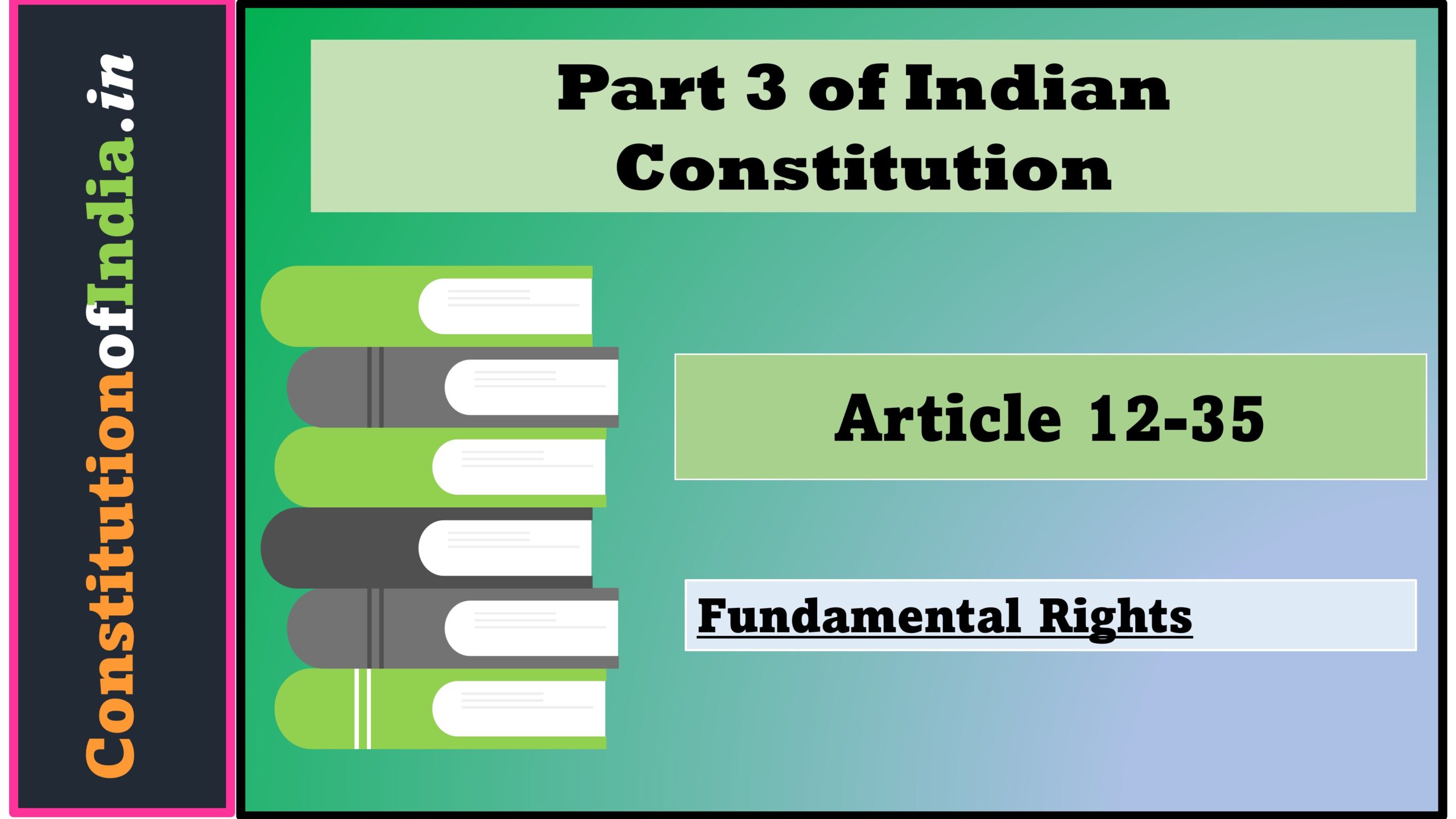Part 3 of the Indian Constitution contains fundamental rights that guarantee individual liberties, such as the right to equality, freedom of speech, right to life, and protection against discrimination. These rights are enforceable and essential for upholding democracy and justice in the country.

Article 12 of Indian Constitution
Article 12 of the Indian Constitution defines the term “State”. The term “State” includes:
- The Government and Parliament of India
- The Government and Legislature of each State
- All local authorities
- Other authorities within the territory of India or under the control of the Government of India
The term “State” is used in a wider context to include all agencies whose actions can be challenged
Article 13 of Indian Constitution
Article 13 of Indian Constitution: Laws inconsistent with or in derogation of the fundamental rights. Article 13 of the Indian Constitution is a significant provision that deals with the judicial review of laws in India. It primarily focuses on ensuring that no law, whether existing or newly enacted, is in violation of the fundamental rights guaranteed by the Constitution.
Article 14 of Indian Constitution Right to Equality (Equality before law)
Article 14 of Indian Constitution: Right to Equality (Equality before law) Article 14 of the Constitution of India guarantees that within the territory of India, the State cannot deny any person equality before the law or equal protection of the laws. In other words, it ensures that all individuals are treated equally by the law, and the government cannot discriminate against anyone on grounds of religion, race, caste, gender, or place of birth. This article forms a fundamental part of India’s commitment to ensuring equal rights and justice for all its citizens.
Article 15 of Indian Constitution
Article 15 of Indian Constitution: Prohibition of discrimination on grounds of religion, race, caste, sex or place of birth.
Article 16 of Indian Constitution
Article 16 of Indian Constitution: Equality of opportunity in matters of public employment Article 16 Equality of opportunity in matters.
Article 17 of Indian Constitution Untouchability (Abolition of Untouchability)
Article 17 of Indian Constitution: Untouchability (Abolition of Untouchability) “Untouchability” is abolished and its practice in any form is forbidden. The enforcement of any disability arising out of Untouchability” shall be an offence punishable in accordance with law.
Article 18 of Indian Constitution Abolition of titles
Article 18 of Indian Constitution: Abolition of titles Article 18 Abolition of titles – Constitution of India No title, not …
Article 19 of Indian Constitution Right to Freedom
Article 19 of Indian Constitution: Right to Freedom (Protection of certain rights regarding freedom of speech, etc.) Article 19 Right to .
Article 20 of Indian Constitution
Article 20 of Indian Constitution: Protection in respect of conviction for offences Article 20 Protection in respect of conviction for …
Article 21 of Indian Constitution
Article 21 of Indian Constitution: Protection of life and personal liberty Article 21 Protection of life and personal liberty – …
Article 22 of Indian Constitution
Article 22 of Indian Constitution: Protection of life and personal liberty Article 22 Protection of life and personal liberty – …
Article 23 of Indian Constitution
Article 23 of Indian Constitution: Prohibition of traffic in human beings and forced labour.
Article 24 of Indian Constitution
Article 24 of Indian Constitution: Prohibition of employment of children in factories, etc.
Article 25 of Indian Constitution Right to Freedom of Religion
Article 25 of Indian Constitution: Right to Freedom of Religion, Freedom of conscience and free profession, practice and propagation of religion.
Article 26 of Indian Constitution
Article 26 of Indian Constitution: Freedom to manage religious affairs.
Article 27 of Indian Constitution
Article 27 of Indian Constitution: Freedom as to payment of taxes for promotion of any particular religion.
Article 28 of Indian Constitution
Article 28 of Indian Constitution: Freedom as to attendance at religious instruction or religious worship in certain educational institutions.
Article 29 of Indian Constitution Cultural and Educational Rights
Article 29 of Indian Constitution: Cultural and Educational Rights, Protection of interests of minorities.
Article 30 of Indian Constitution
Article 30 of Indian Constitution: Right of minorities to establish and administer educational institutions.
Article 31 of Indian Constitution – 31A, 31B, 31C, 31D
Article 31 of Indian Constitution: Saving of laws providing for acquisition of estates, etc.
Article 32 of Indian Constitution – Right to Constitutional Remedies
Article 32 of Indian Constitution: Right to Constitutional Remedies, Remedies for enforcement of rights conferred by this Part.
Article 33 of Indian Constitution
Article 33 of Indian Constitution: Power of Parliament to modify the rights conferred by this Part in their application to Forces, etc.
Article 34 of Indian Constitution
Article 34 of Indian Constitution: Restriction on rights conferred by this Part while martial law is in force in any area.
Article 35 of Indian Constitution
Article 35 of Indian Constitution: Legislation to give effect to the provisions of this Part.